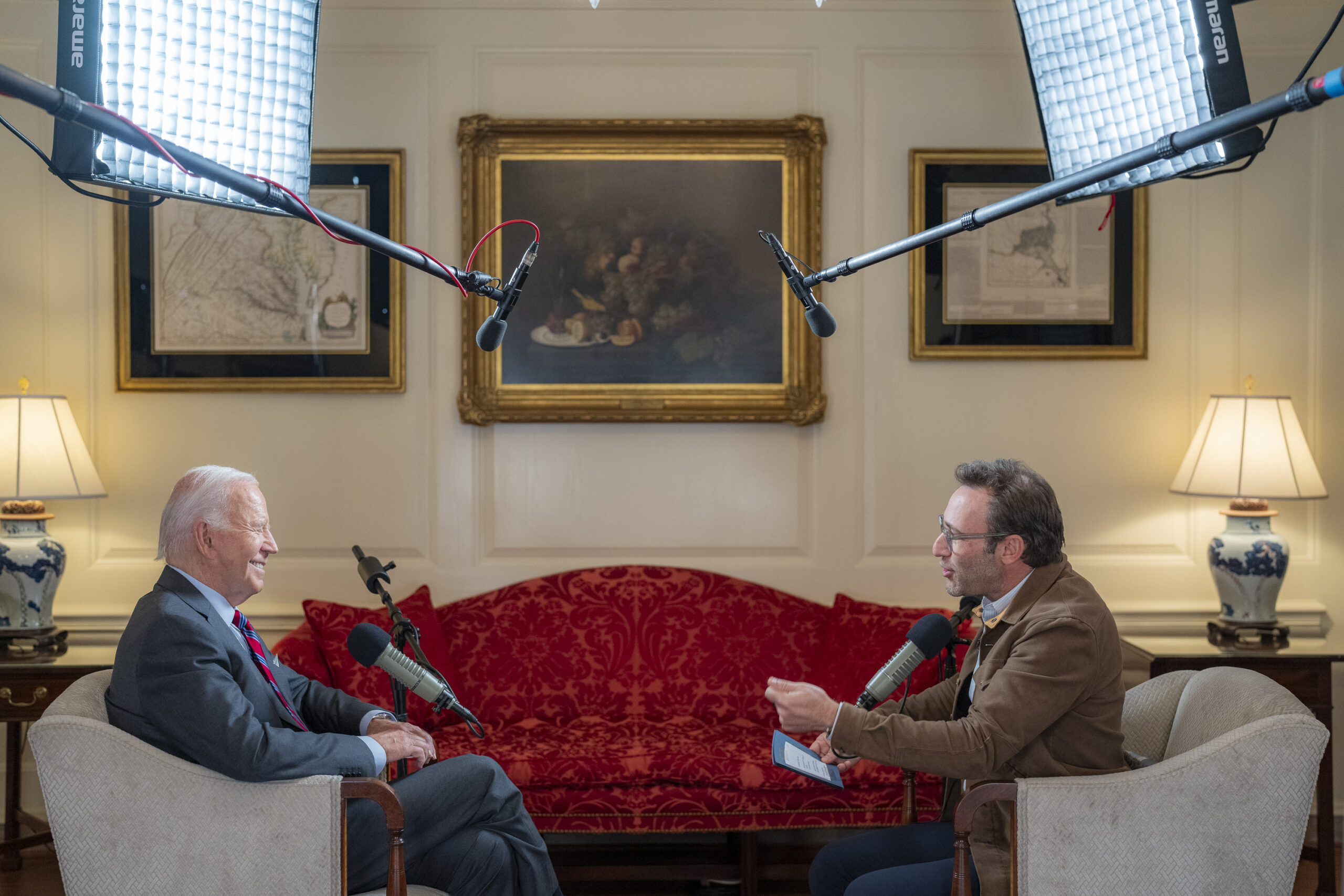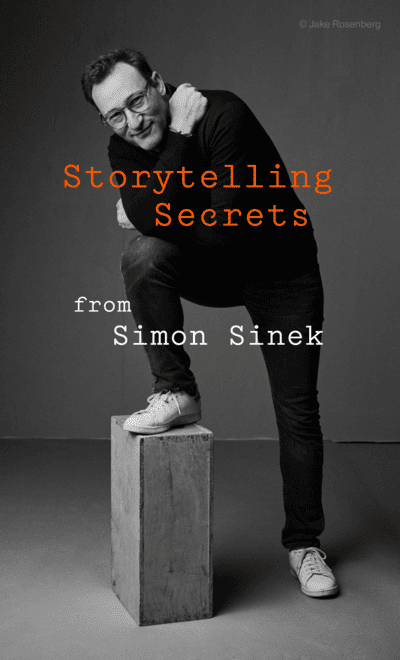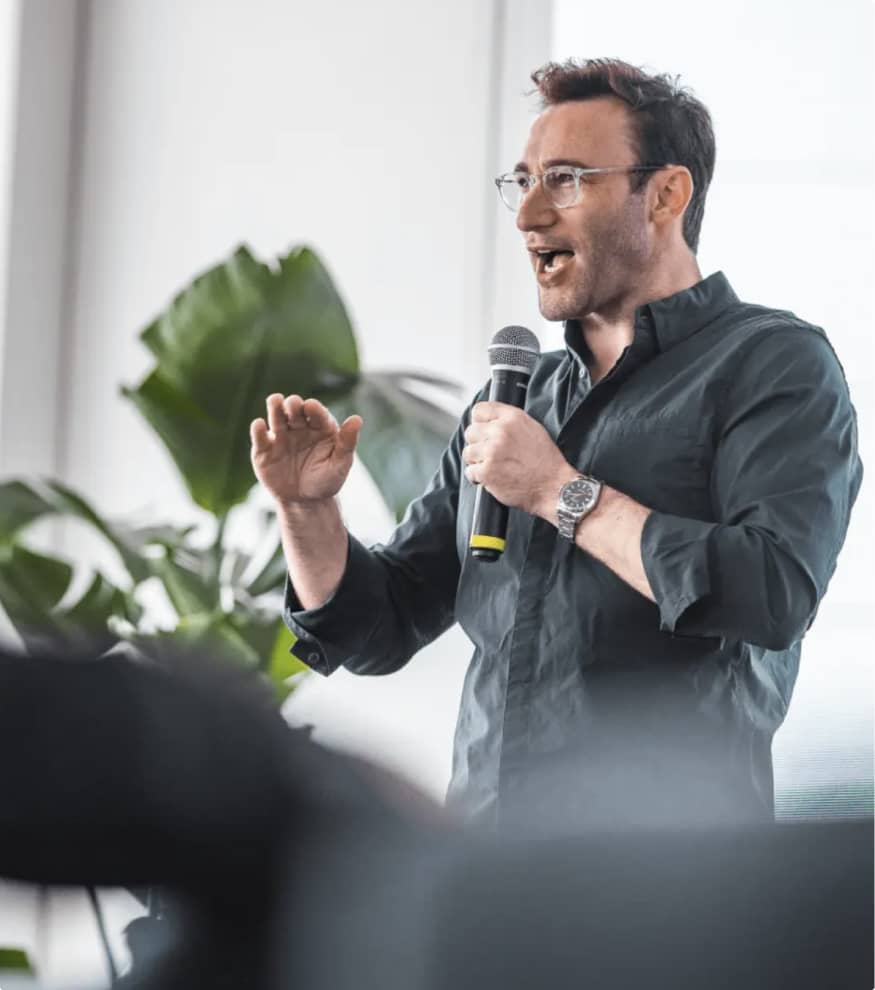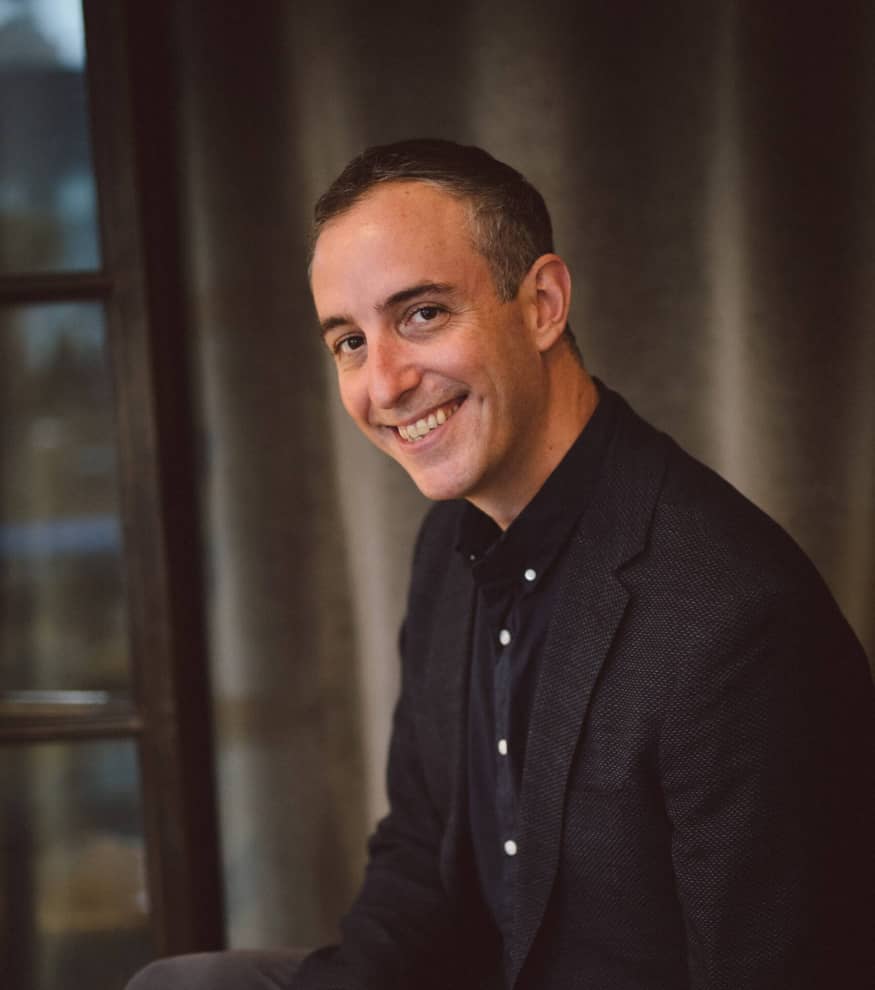Leadership is deeply personal. As people change, the way they lead has to change, too.
Few leaders have navigated as much change as Joe Biden. He was elected to the Senate at 29 and will end his time as President at 82. The number of things he has witnessed and been a part of over the course of his career is remarkable. His journey has been shaped by unlikely friendships and profound personal loss.
I had the honor to sit down with President Biden at the White House to reflect on how his experiences have influenced his approach to both life and leadership.
I chose to stay clear of politics and instead focused on the lessons that are applicable to all Americans…and indeed all people. I hope you find it insightful and inspiring.

You can listen to this episode of A Bit of Optimism here or watch the episode on YouTube.
A Lifetime of Leadership with President Joe Biden
SIMON: Mr. President, thank you so much. This is such a treat for me, as a student of leadership, to sit down with somebody who — I mean, whether you know it or not, you’ve studied leadership for most of your life.
And so, I want to start with a question that’s rather timely, if I may. My 13-year-old nephew, Jacob, is running for class president today, actually. And so, I was wondering if you have any words of advice for young leaders on what he should expect should he win the election that he’s running for? (Laughs.)
THE PRESIDENT: He should expect to have to do what he said he’s going to do.
Look, I remember I used to stutter when I was a kid, but I was always sort of the leader of the pack, of my gang. And I was elected class president in grade school and high school.
And the biggest thing is, I think, for him to let people know that he cared about what he said. And it sounds silly to say that, but I really mean it. It doesn’t matter how old you are. People know whether or not you meant what you said.
SIMON: When did you learn that lesson?
THE PRESIDENT: I kind of won the gene pool lottery. My dad used to say, “You’re a man of your word. Without your word, you’re not a man.” From the time we were kids, when we were little, my mother would look at you and say, “Joey” — she was five foot one, had a backbone like a ramrod, but she was everybody’s Mother Confessor. She’d say, “Joey, remember, courage lives in every heart, and someday it will be summoned. You’ve got to do what you say you’re going to do.”
I think of all the expressions that I grew up believing, my mother would say that, “If you have to ask, it’s too late,” and my dad would say, “Family is the beginning, the middle, and the end.” I mean, for real. If you ask any of my friends I grew up with, they can quote my mom — (laughs) — and my dad and my grandfather and others.
So, it was all about just — I know it sounds silly, but my dad’s favorite word was “dignity.” He’d say, “You’ve got to treat everyone with dignity. Everyone’s entitled to be treated with dignity, no matter who they are.”
And people can know it. They sense it. They feel it. They can taste it.
You say you won the genetic lottery, but it sounds like you won the lottery for parents.
Well, that’s what I meant. I was fortunate that I had the benefit of a family that was middle class; we didn’t have any money. But it was all about how you treat everybody.
And, you know, I remember when I was a young senator, I met my dad at the Hotel DuPont, which was a four-star restaurant at the time. He was in town for business. He ran an automobile agency. And I remember coming down the elevator, and the Chairman of the Board of the DuPont Company came down. And my father said, “Hello.” He said, “Hi.” And just — that was all, just nice. Then he walked over to the shoeshine guy, and he talked to him. I said, “Dad, why is that?” He said, “Everybody deserves to be treated with dignity.” That was my father.
These are the stories that I’ve heard about you that I think most people don’t realize, because they generally happen off camera, which is you come in and say hi to the guy setting up the teleprompter. And, I mean, it’s nice to know that if your parents could see you now, that you’re still doing the things that your dad taught you when he went over to the shoeshine guy.
Well, my mother used to say, “Remember, Joey, no one is better than you. You’re no better than anybody else. You’re the same as everybody. You’ve got to treat people with respect.”
And, look, maybe if I had come from a different circumstance, we would be the guys that would be, figuratively speaking, holding the teleprompter.
But I think a lot of people forget where they come from, as people gain power or rank or money. You and I have both met people who think they deserve the rank they’ve been offered. And I’m so curious, because we both know that humility and remembering where you come from is essential: how do you stay so grounded? Like, you’re the President of the United States. They call you the Leader of the Free World, and yet you maintain the humility to remember where you come from? How?
Oh, it’s easy. (Laughs.) My staff jokes with me. For the first two years I was president, every time they’d play “Hail to the Chief,” and I’d literally wonder, “Where the hell is he?” You know?
The people I grew up with were the people who — that I knew and liked the most — were people who were just looking for a shot, just looking for an even shot. There weren’t a whole lot of folks that I hung out with that were very entitled.
You stayed friends with a lot of your childhood friends.
Yeah.
And I understand that, I think it was last week, you went to a funeral for a childhood friend. Again, I can only imagine your schedule, and that you took the time to go to the funeral of a childhood friend.
He’s one of my oldest friends. We go back to being in St. Paul’s grade school in Scranton, Pennsylvania, when I was in kindergarten. And we stayed friends throughout our entire lives, over 70 years. How could you not go?
And it was important to go for another reason. Because I’m president, it’s important for his family to know that it didn’t matter. Tommy was still one of my best friends. He was smarter than I was. He was faster than I was. I mean, he was just — he was just a friend. It’s a lucky man or woman that has a really, truly good friend and I’d known him my whole life.
You talk about friendship, and one of the things that I’ve sort of come to see is that there’s an entire industry that’s trying to help us be better leaders, an entire industry that tries to help us be better parents, an entire industry that teaches us how to eat better or exercise better. But there’s precious little that teaches us actually how to be friends.
And I think most people think they’re good friends, but if you peel the onion just a little bit, I think most people actually could be better.
For example, do we cancel on work for a friend, or do we cancel on a friend for work? We usually cancel on our friends because, you know, our friends will understand. And yet here you are — I think you set a remarkable example that you clear your schedule and travel to go to the funeral of a childhood friend.
I know that, for you, it seems normal and natural, but it’s actually becoming something that people are struggling with. It’s a dying art, how to be a friend.
Look, I have an advantage. I’m President of the United States.
(Simon laughs.)
No, I’m not being facetious. For example, I have a rule. I realized when we were doing the Bork hearing, which was a very controversial hearing, the fellow who had done the most research, the most informed — this was a five-month process — this particular guy was having trouble at home with his family. And the hearing started, I said, “No, you can’t show up.” He said, “But I’m the only one that–” “Go home. Take care of first things first.”
And I didn’t realize my whole staff didn’t know that. So, I write a letter to every new staff member. If you have a personal problem and it’s real, you don’t have to tell me what it is; just tell me you can’t be in, and go take care of it. Take care of it. Because I know you’re not going to lie to me, and if you do, you’re fired. But if you need it, just take it. And you don’t have to tell me it’s because your son is dying or your wife and you are having a problem or your mother is ill. You don’t have to give me any explanation.
Because that’s what I did. After I got elected, you know, my wife and daughter were killed, and my two boys were badly injured, and life was kind of upside-down. And to make a long story not quite so long, it was one of the things that made me decide that I didn’t want to stay in the Senate. And a number of senators — five of them got together, from Teddy Kennedy to Tom Eagleton to Fritz Hollings, to convince me to stay for 10 months.
And what I realized then was that I had to have a rule: If there’s something important to my children and there wasn’t a critical vote, I’d go to the parent-teacher meeting. Not a joke.
My wife tells a story about how when our daughter, it was her birthday, and it was a big deal. But I used to commute every day on the train. So, what I did was I found out there were going to be four hours between the vote, so I got on the 4 o’clock train, got off at 5:30. She was standing on a platform with a cake to blow out the candle. And I got on the southbound going south, because that’s what family does. And I was able to do it.
I had 500,000 bosses at that point — a million bosses — but it’s much harder if you have one boss who can fire you. So, everybody in my staff knows, for real, if you’ve got a personal problem, just say, “I can’t be in” and go.
And so, it’s not that I’m being so noble. I just want them to be able to do the same thing I can do.
You talk about when you lost your daughter and your wife, that the relationship with your sister got a lot closer.
It was already so close. She has been on my handlebars since she was three years old. I really mean it. She’s my closest friend in life. And she has more courage and brains.
So, when I lost my wife and daughter, she had just been married, and she and her husband gave up everything. They were hospitalized for a long while, my surviving sons, and I stayed in the hospital. When I came home, they had given up their home; they had moved into my house, helped me raise my kids.
That’s amazing.
And two days after I got married the second time — no man deserves one great love, let alone two. Years later, I got married again. I came home, and they were gone.
They were just there to support.
Yeah. And they’re always there to support me. She managed every one of my campaigns. She called me this morning — anyways, long story.
To change tack slightly. You know, trust in government has declined precipitously over the years. I think in the 1960s, it was something like 70 percent of people trusted government, and now the numbers are hovering around 20 percent. You have been inside, in government this entire time, watching what was going on behind the scenes, while that trust eroded in the public.
Looking from the inside out, could you start to see what was happening, the way that business was being done, that you could predict that this is not going to be good for government and the relationship with the general public?
I was a Senator for 36 years. And so, I had a lot of friends on both sides of the aisle. We’d argue like hell, but we were friends.
And so, when I was Vice President, things really began to go south. I realized we weren’t talking to each other very much.
So, what I did was, when I was President of the Senate, I showed up to go to lunch in the Senators’ dining room. There’s two dining rooms down that hall by the elevator, the first floor. In one, there’s a waiting room, and then there’s a big restaurant where I could take you — as a Senator, I could take you as my guest.
There’s another one to the left that is a room that as you walk in, there’s a big archway at the other end, two large tables that can seat, I guess, 15-20 people at each table with a buffet. Only Senators are allowed in there.
And so, what happened was I learned from Teddy Kennedy — he was a great friend. He really helped me out — the whole family did — emotionally helped me out.
And Teddy used to come by and say, “Come on, go to lunch with me, Joe.” I’d say, “I don’t want to go to lunch.” So, finally, one day, he came to the office, about six, eight months in, and said, “You’re going to lunch with me, damn it.” So, I got up and went over, and he said, “Just sit and listen. You’ll learn more by sitting and listening to these guys.”
And he was right, because when you learn that a man has a son that has a drug problem or his wife has breast cancer or he just lost his mother, it’s hard to really dislike him. You get to know him a little bit.
We used to travel together on foreign trips with our families — our wives – with us, and you got to know one another. You can disagree like hell, but you don’t hate them. You don’t cast aspersions on them so, I decided I was going to go. It’s presumptuous to say, but I think most people would say I got on pretty well with most Senators on both sides of the aisle.
And so, when I was Vice President, I could feel things were going bad. A lot of things that never were said before to one another. So, I went over to have lunch in the Senate, because I knew a lot of these guys. There’s no place you can have lunch anymore.
Oh, really?
I walk in, and there are just armchairs or couches.
Huh.
If you’re a Republican Senator, and I’m a Democrat, there’s no place to go and eat together unless it’s one of our offices. There used to be 20-25 Senators, both parties, in one large room, and we got to know each other.
People don’t talk. It’s easier to really dislike someone, to ascribe the worst characteristic to them, when you don’t know anything about them.
Yeah.
And that’s what’s happened.
Did it really start when Congressmen and Senators used to move to D.C. ? If they got elected — move their families to D.C., they all went to, you know, PTA meetings together and baseball games together, and then that stopped.
You know, people live on their couches now, or they get a temporary apartment. Was it because they weren’t hanging out, you know, after work?
It’s really important, I think, in public life, to understand where the other guy is coming from.
Yeah.
So, for example, it’s one thing to have a policy position on manufacturing when you’re from a manufacturing state and another thing for you to come from a farming state. Well, you got to understand where the other guy is from, why he has limitations, why he ran on things that are different than what you think, because we’re 50 different states.
And we don’t seem to do that anymore. We don’t seem to understand the other guy– for example, John McCain. John McCain, after he came back as a prisoner of war, came to work for the Senate as a military attaché, helping Senators when they traveled abroad. There were five of them. We became really good friends. We traveled a couple hundred thousand miles together.
He’d come to my home. His second wife I introduced him to. We stopped in Hawaii on the way to Japan, and I could tell he really liked this woman, who was the Admiral’s daughter. And I said, “Hey, I” — and so, I went up and I introduced myself to her, and I introduced John.
You were John McCain’s wingman?
I sure as hell was.
But John and I, we argued like hell. But we were friends. We never attacked one another’s character.
Yeah.
And it really matters.
As you’re talking about it, the thought that’s going through my mind that actually kind of makes me a little bit sad is that, you know, we follow our leaders. Kids model themselves after their parents, and we model ourselves after our leaders. And all the way up to President of the United States, you can actually dictate some of the behaviors of the nation.
And, if I look at the state of America right now, we don’t like to listen to people who don’t look like us, sound like us, or have different political views than us. And I thought that politicians were a reflection of us, but now I’m starting to hear from you that we’re a reflection of our politicians, that they were the ones who stopped reaching across the aisle.
Well, I wasn’t going to run again after my son died. And he died in 2015, on Memorial Day. And I was going to write another book on the inflection points in world history.
I think the things that happen in a relatively short period of time, since the 1500s, determine what it looks like for the next six, seven generations. For example, the idea that Europe would ever have united without Gutenberg’s printing press wouldn’t have happened.
And look what’s happening now. Where do you go for the truth? Look what’s going to happen with artificial intelligence. Someone sent me on my iPhone, a video where I’m making a speech that makes me sound like a fascist. I couldn’t tell it wasn’t me. By looking at it, I could not tell. So, we have to figure out how we’re going to deal with this.
Let me put it this way. The number of people that get their news from mainstream media is de minimis. And the mainstream media, there are no editors anymore. Nobody is saying, “You can’t print that; that’s not true.” Everybody’s looking for a click.
And I’m not being critical of them because they — that’s how they get paid.
Well, it’s a misaligned incentive structure, isn’t it?
Yeah.
You know, it’s personal gain from what I can say. And when that gets screwed up, integrity is sacrificed pretty quickly.
Yeah. And so, for example, the stuff that people are saying now about Kamala — I mean, just making it up. And I think it’s getting harder. I really am worried. I’ve made three major speeches on my concern about the future of democracy in America. I mean, it’s really very, very difficult. If you say it enough, say it enough, say it enough, say it enough, people believe it.
So, if you have one source of news that already has a determination of outcome, you’re going to hear the same thing 1,000 times.
You start to believe it.
You hear it enough, you begin to believe it.
Yeah. You as a leader — I mean, I can imagine when you were elected: 29 years old, you show up in the Senate, starry-eyed and, sort of in disbelief. And you weren’t the leader then that you are now. I’m sure you’ve grown. How did the Senate help you grow?
Well, when I showed up in the Senate right after the accident, there was nothing starry-eyed about any of it. I mean, I didn’t enter the Senate happy and excited, and I only agreed to stay for a while.
Senator Mansfield, who had a great deal of integrity, he used to tell me that it’s always appropriate to question another man’s judgment but never his motive. You don’t know what their motive is. And it’s one of the rules I’ve kept, and that’s why I think I’ve been relatively successful. But the point is —
Relatively. (laughs)
Well, only relatively.
I’m being facetious, you’re President of the United States, I think it’s worked out okay.
I kept thinking about what — what would my family want of me. I was lucky. I had some real mentors who looked out for me. And so, it wasn’t that I was starry-eyed. I didn’t want to stay. I would always walk into the Senate, walk in after 5 o’clock, go up to the Secretary of the Senate and say, “How many more votes,” so I knew when to catch the train to go home to be with my kids.
There’s a line in the musical “Hamilton,” “in the room where it happens.” You know, “are you there in the room where it happens?”
You have met a lot of world leaders over the course of your political career, and you’ve had a lot of private conversations with leaders who are friends of our nation and sometimes with leaders who… there’s tension between our nations.
Is there a common thread that you have found when you go into these meetings but what actually happens in those meetings?
Well, I was the second-youngest Senator in history and I’m the oldest President in history, I’ve probably known personally and spent time with more world leaders than any President has in American history — not to make good or bad, just longevity.
And you know an awful lot about the positions of these folks before you go in. And one of the things I’d find, no matter what it is, is being straightforward is always the best bet, especially when I want to really get down with another world leader I disagree with, Putin or whoever. I do it alone, just him and I in a room.
Because you take the measure of a man, whether you know he knows he’s lying to you or you know he thinks he’s telling you the truth, you get a sense of whether or not they mean what they say or they are just trying to mislead you. And that also requires an awful lot of intelligence background and work on knowing these people.
For example, he wouldn’t mind my saying it, when I got all those prisoners freed from Russia, one of the things I had to do was get the Chancellor of Germany to release a really bad guy in return for getting those. And I trust him. I know him. And I knew it was a hard call. He saw my wife at the Olympics, and he said, “Only reason I did it is I trust Joe. I did it for Joe.”
I used to drive Barack crazy because we’d start every day together at nine o’clock in the Oval Office, and one of the things I would always say to him: “All politics is personal.” It’s personal. It’s a personal relationship. It matters to know who the other person is.
And I think most of these guys — good, bad, or indifferent — are pretty good reads of personalities, they can tell whether or not you mean what you say, you say what you mean, and you have any empathy.
And so, I think it really matters building personal relationships.
So, one of my favorite things about America is our optimism and our idealism. And I love to joke with my friends that we celebrate our Independence on July 4th, 1776, but that’s not when we had independence. That’s when we signed the Declaration of Independence. We didn’t win our independence until September 3rd, 1783 —
Good point.
— with the Treaty of Paris, full seven years after the signing of the Declaration of Independence. But in true American fashion, you know, we celebrate our independence from the day we thought about it, not the day we actually had it. And I think George Washington wasn’t elected until six years later.
And this is my favorite thing about America: we just believe we can. But it seems to feel these days that our idealism and our grand sense of optimism seems to be diminished. And it seems that our leaders in politics don’t talk about world peace anymore. They don’t talk about big ideas. A lot of it is small, a lot of it is wins and losses and taking the win and making sure the other guy has lost.
So, A) is that true? Do you think that we’ve lost our idealism, maybe since the fall of the Berlin Wall? And if so, what do we do to get it back?
I haven’t lost my idealism. I end all my speeches by pointing out there’s not a damn thing America can’t do if we do it together, nothing. And I believe that. Not a damn thing; not a single, solitary thing.
And if you notice, I get criticized. For example, I put together a peace plan for Israel and Gaza. I got it adopted by the entire U.N. Security Council, all of our NATO Allies. I get asked by the press, understandably cynical, saying, “What makes you think they can make it work?” I mean, “You got that done, but what’s going to happen?” But we continue to work on it. We continue every day to plow away at deciding to try to change the dynamic and change the leadership in other places as well.
I think we’re the only country in the history of the world that has come out of every crisis stronger than we went into the crisis. I mean that sincerely.
Like, for example, I spent more time with Xi Jinping than any world leader has. And I was in China with him, and he turned to me. He said, “Can you define America for me?” I said, “Yes, in one word,” and I meant it. He said, “What’s that?” I said, “Possibilities.” We think anything’s possible.
You said, “We can achieve anything if we work together.” And the problem is that we’re not very good at “together” anymore.
Well, guess what? Remember they told me I could never get the plan done for infrastructure? I got one trillion three hundred million dollars.
They told me I couldn’t get the veterans’ benefits done. I got it done.
They told me I couldn’t get — every single thing we passed, five major pieces of legislation. And we’re now in a situation where we have the most — our economy is the strongest economy in the world.
So, what I have been surprised about, and I will not tell you the names because I promised I wouldn’t, in my first two years, there were seven Senators from the other team that I used to work with who individually called me to tell me, “Joe — I agree with you, but I just can’t do it.”
Yeah.
“I just can’t do it.”
What surprises me is, what is it that’s changed in terms of the kind of — I know they don’t agree with this MAGA malarkey. But why? What kind of threat does Trump have holding over these people?
For example, the border. We worked for four damn weeks, a month, to work out a deal on the border with one of the most conservative Senators in the United States Senate. We got a deal. God, we’re about to make it — have it pass. As it was voted on, Trump picked up the phone — this is public knowledge — called Republican senators and said, “You’re in trouble with me if you support this. All you’re going to do is help Biden and hurt me,” even though he acknowledged it was the single most significant thing we could have done. That is a big change.
I think it goes back to where we started this conversation, which is, when we could no longer see each other as human, we become caricatures and we no longer are willing to invest in building relationships and trying to understand.
And you said in the Senate when you could just sit down and eat with people, because the literal environment encourages people to eat together. And now you cannot.
Well, but these guys knew that was the right thing to do. That’s unusual for someone to know and — and they’re good people. They’re decent women and men.
You’ve had a remarkable career. You’ve achieved some amazing things over the course of your career. I’m curious, was there one thing, one project, one piece of legislation — it doesn’t even matter if it was successful, but something that you’ve worked on, something specific that you’ve worked on over the course of your entire career that you loved, loved being a part of that process and if everything you worked on your entire career was like this one thing, you’d be the happiest person alive?
The Violence Against Women Act.
Say more.
Well, at the time I started to talk about it as Chairman of the Judiciary Committee, I had done a lot of research on it, and people said, “You can’t do this.” And even people who thought it was unfair, thought it was interfering. I was going to break up families. But I just kept at it for two years. And I wrote it with, as my daughter would say, “with my own paw.”
And it’s the most significant thing that I’ve ever done because I’m of the view that there’s not a damn thing in the world that a man can do that a woman can’t do. I mean that sincerely — nothing. Number one.
Number two, the victimization and abuse of women — my father used to say, “The greatest sin of all is the abuse of power. And the greatest abuse of power is a man who lifted his hand to a woman or a child.” It was rampant, but we’ve made so much progress, changed so many lives, given people hope, and saved the children in those circumstances.
Let me push you a little bit, which is, you’ve done amazing things. What is it about this specific act, The Violence Against Women, that stands out amongst all the other remarkable things that you could have talked about?
Because there were so many people, millions of women, who were in a situation where they couldn’t get out. They didn’t have any options, and we changed the law. We changed the rules. We changed everything from providing housing, to providing opportunities. And what it’s done, it’s also created a generation of women who don’t put up with it anymore, who are able to step back from it.
But the biggest thing it’s done, in my view, is see the incredible change in opportunity it presents for the children of these marriages.
But what is it that you loved about it?
Because I was a runt. I was a skinny guy who stuttered. But the abuse of power was the worst thing anyone could exercise.
And for example, I remember when we lived in Scranton, Pennsylvania. We would go home for the summers and live in my grandpop’s house all holidays and everything. And one day we were up there, and there was an area in Scranton — I lived in a place called Green Ridge, which was a middle-class neighborhood, and there’s a place called “the Plot” down by the Lackawanna River. And the guys in the Plot had some tough gangs, and they’d come up our way. I was 13 or 14 years old, and a group of guys came up from the Plot on Dimmick Avenue, which was behind my house. And my mother was looking out the window in the pantry. She looked out there — it was a small backyard — and sees this one guy — he was a little older than me — smack me and really hit me in the face, and knock me down.
And I got up, and I came walking in and my grandfather was at the kitchen table, retired — “What’s a matter, Joey?” I told him. He said, “Ah, that’s a shame, honey.”
I walked in, my mother said, “Come here, Joe. I just watched what happened. You go back out there and smack him.” I said, “Mom, he’ll kill me.” She said, “I’ll give you a quarter if you do.” She said, “Because if you don’t, you’ll never be able to walk out there. Yeah, but one thing, Joe, when you walk out, you’ve got to make sure — wait until he comes up to you and you gotta hit him right in the nose as hard as you can.” I said, “He’ll kill me.” She said, “Joey, I’m telling you.”
So, I went back out — and I was more afraid of my mother… and I hit his nose. He started bleeding. He went, “Ahhh!” and ran.
The point was, my mother would say, “You just can’t yield to a bully. You can’t do it.”
I was scared to death. It wasn’t that I was so brave. And that’s what Tommy Bell and I were talking about before he died. (Laughs.)
The thing that I’ve loved talking to you about and the pattern that I see over this entire conversation, from the legislation that you’re proud of and the conversation about friends and the losses you’ve had as in your in your personal life and this story as well, is: you always provide protection for people so that they can do the thing that they need to do to protect others.
So, just like your mom was — gave you top cover. For you to go fight the bully, and you passed legislation so people could go protect other people. And even with what you do with your staff, you give them safe space to go look after their families.
And it seems like through your whole career, you’ve offered people the safety and protection and backup so that they can do that thing for others, that the people that they love.
Everyone, everyone, everyone deserves a fair shot. And there’s so many ways we can do it.
That’s beautiful. Mr. President, thank you so much for taking the time.
I’m not sure this was worth your time, but thank you —
Such an honor. And so inspiring. Thank you so much, sir.
Well, thank you. Appreciate it.
Thank you.

